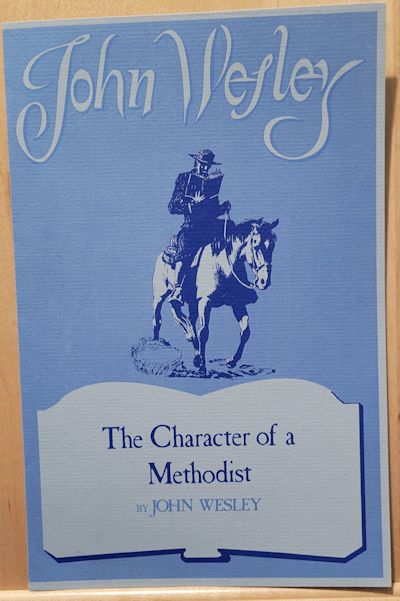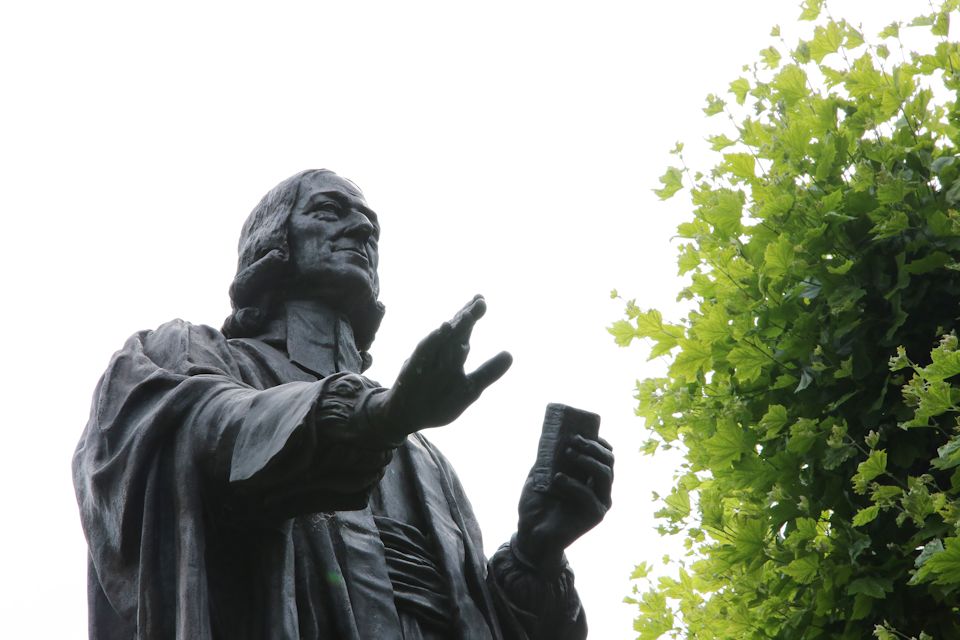Rev. Dr. Jerome Devine lifts up passages from Genesis and Mark to help us consider divine hospitality and how we may each bless others as United Methodists face the separation to come.
JEROME DEVINE
Superintendent, Mid-Michigan District
And Abram said to Lot, “Let there be no strife between you and me, …, for we are kindred. … If you take the left hand, then I will go to the right; or if you take the right hand, then I will go to the left.” (read Genesis 13:1-9)
Co-existence and blessing one another.
The two scripture passages that I chose for this blog have been on my heart and mind for several months now, so now this gives me an opportunity to explore how they might offer insight for our United Methodist Church globally as well as locally, especially in the heightened emphasis on denominational transitions.
Both stories are about Divine hospitality in the midst of human relationships and challenges. Both stories reveal a glimpse of Divine grace in the midst of tense situations. Both have grace-filled endings. There is commonality between the stories, yet the approaches to the outcomes are distinctly different.
How did Abram bless?
Abram, who we come to know later as Abraham, is deemed the grandfather of the three great monotheistic religions of the world: Judaism, Christianity, and Islam. Abram was nomadic, traveling with his family, herds, servants, and belongings yet within the bounds of his land of origin. Then the Lord told Abram to “Go from your country and your kindred and your father’s house to the land that I will show you. I will make of you a great nation.” Therefore, Abram did as God had commanded him. As he traveled, Abram also took his nephew Lot and his family and belongings. They journeyed first to Canaan and then on to Egypt and eventually back to Canaan. That is where we pick up the story.
The book of Genesis tells us that up to this point Abram and Sarai do not yet have a child of their own. Lot is the son of Abram’s brother, yet I would have to think he was very close to Abram’s heart as well. Family ties can be very strong. Perhaps that is why it is so painful and difficult when tensions arise in those family relationships.
It goes without saying that the dynamics of the COVID-19 pandemic as well as the political polarization in the past few years in this country have strained many households and extended family ties. For Abram and Lot, they had survived a previous drought and tensions in Egypt but now tensions have arisen between their livestock herders. Allegiances to each side would have been strong. Frankly, it could have gotten ugly in a hurry.
This is where that glimpse of Divine hospitality and grace came into play. Abram, as the elder, could have unilaterally ordered Lot to leave and return to the land they came from. Instead, he created a gracious space out of which they could remain in relationship. Remember those words:
And Abram said to Lot, “Let there be no strife between you and me, …, for we are kindred. … If you take the left hand, then I will go to the right; or if you take the right hand, then I will go to the left.”
Co-existence, mutuality of relationship, and the blessing of one another. Yet, it also meant there was a separation. A gracious space did bring change. However, it was not acrimonious or adversarial change.
As a pastor and as a parent, I have journeyed with couples who have chosen to separate and divorce. These decisions were not made lightly and were often filled with complex and sometimes painful situations. However, how the two parties chose to take separate pathways made a huge and life-impacting difference. I have a friend who recently went through such a separation and divorce. He will remain anonymous out of respect for his privacy. However, his story resonates with what our scripture brings to light for me. He shared with me that he and his former wife were still best friends, that he talked with her frequently and they went out to lunch once a week. They still loved and respected each other. They simply could not live in the same household because their patterns and ways of looking at daily life were too far apart. They had to create a gracious space in order to remain healthy and in relationship. In some ways, it reminds me of the story of Abram and Lot.
How did Jesus bless?
Now let’s turn to the story from the Gospel of Mark (Mark 9:38-41). Mark’s version of this episode is the shortest in the Gospels. These four verses reveal the tension that can come about when we want to make certain we are doing things right and following the truth as we understand it. I love the transparency of the scripture because it can reveal the struggle that we human beings exhibit quite regularly.
In the story, one of the core disciples, John, comes to Jesus, in what was likely an animated manner, and says, “Teacher, we saw someone casting out demons in your name, and we tried to stop him, because he was not following us.” I am guessing that John thought he would be affirmed for telling the other person that you have to do things the way we do or you do not fit in. It went an entirely different direction.
In fairness to John, he took his calling, his faith, and his following of Jesus very seriously. However, in his zealous pursuit of what he understood to be the right way he lost sight of the gift of expansive grace, widened community, and the unity of the body of believers following Jesus’ way in the world.
Father Robert Spitzer, a Jesuit priest and scholar paraphrases Jesus’ response to John:
Jesus very gently says, “Here’s a guy who really does want to do good. He’s going to do a mighty deed. He’s going to do a miracle in my name. How can he speak ill of me if he’s using my name to do good, to heal people, to do this mighty deed? How can he do this mighty deed, inauthentically, and still have the Holy Spirit work through him in my name? Don’t worry so much about this. This is not the exclusive club. This is the inclusive club, that is to say, our ministry is open to people who want to use the name of Jesus to heal.”
How did Wesley bless?

John Wesley, the primary founder of Methodism, wrestled with the tension between perceived rightness and the yearning for unity in his sermon entitled “A Catholic Spirit.” It was preached and published in 1771, a time when there was considerable tension between varying expressions of Christianity, as well as political tension in England and the colonies that became the United States. I want to share a portion of that sermon because these words are just as relevant today as they were when he first preached it:
- Even those who do not pay this great debt concede that love is due to all humankind, the royal law, “You shall love your neighbor as yourself.” It carries its own evidence to all who hear it. This does not mean, according to the miserable construction put upon it by the zealots of old times, “You shall love your neighbor,” your relation, acquaintance, friend, “and hate your enemy.” Not so; “I say unto you,” said our Lord, “Love your enemies, bless them that curse you, do good to them that hate you, and pray for them that despitefully use you, and persecute you; that you may be the children,” may appear so to all humankind, “of your Father which is in heaven; who makes his sun to rise on the evil and on the good, and sends rain on the just and on the unjust.
- But it is sure, there is a special love that we owe to those who love God: “A new commandment I give unto you, That you love one another: as I have loved you, that you also love one another. By this shall all people know that you are My disciples if you have love one to another” (John 13:34, 35).
Wesley goes on to say:
This is that love on which the Apostle John so frequently and strongly insists: “This,” says he, “is the message that you heard from the beginning, that we should love one another” (1 John 3:11). “Hereby perceive we the love of God, because he laid down his life for us: and we ought,” if love should call us thereto, “to lay down our lives for the brethren” (verse 16).
And again: “Beloved, let us love one another: for love is of God. He that does not love, does not know God; for God is love” (I John 4:7, 8). “Not that we loved God, but that he loved us, and sent his Son to be the propitiation for our sins. Beloved, if God so loved us, we ought also to love one another (verses 10, 11).
Then Wesley lays down the challenge:
- All men approve of this; but do all men practice it? Daily experience shows the contrary. Where are even the Christians who “love one another as he has given us commandment?” How many hindrances lie in the way! The two grand, general hindrances are, first, that they cannot all think alike and, in consequence of this, secondly, they cannot all walk alike. However, in several smaller points their practice must differ as their opinions differ.
- But even though a difference in opinions or modes of worship may prevent an entire external union, yet need it prevent our union in affection? Though we cannot think alike, may we not love alike? May we not be of one heart, though we are not of one opinion? Without doubt, we may. In this all the children of God may unite, even though they retain these smaller differences. These remaining as they are, they may help one another increase in love and in good works.”
End of quote.
How may we bless?
I suspect that every person reading this blog loves God and yearns to know God more fully in their daily lives and relationships. I suspect that the majority desire to follow Jesus faithfully in the midst of the challenges and situations that life and relationships present us. I suspect, deep down, that most desire a sense of unity within your faith community. And, I suspect, that there are also some that are a bit apprehensive about what is evolving in the larger United Methodist movement, and within your own congregation.
I invite you to meditate on these two scripture passages and to contemplate what the Divine hospitality, Divine grace, and gracious space might look like and need to be here in The Michigan Conference and in your local church. There will be a separation into different expressions of our Methodist heritage. Yet, like Abram and Lot and their families, we will still be living next to one another. We will still see one another in public spaces and will need to decide how we wish to treat one another and how we collaboratively can minister to the communities around us. If we denigrate one another, what witness does that give to the wider community? If we truly bless one another, how might that be seen and experienced by those not a part of our faith communities?
Last Updated on September 20, 2022

